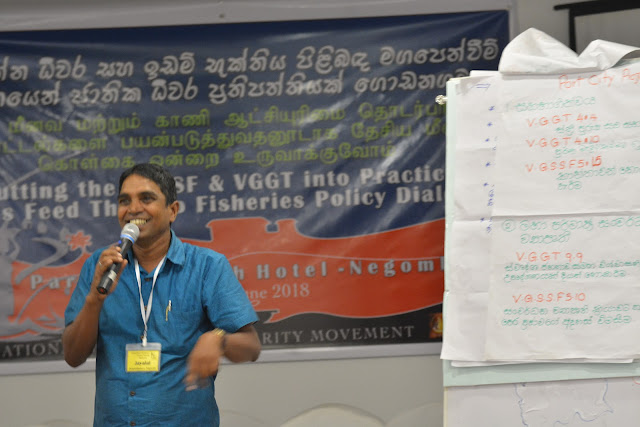The knowledge and understanding on VGGT and VGSSF is as tool for advocate the land, fisheries and forest rights of the communities is somewhat at the surface level and need to strengthen collectively although several programs being conducted at the grass root communities. NAFSO’s main aims are to ensure food sovereignty, poverty eradication and ensure employment generation for rural poor would be in danger in the current context of neo liberal economic programs adopted by National Government of Sri Lanka, hence more people should understand what are the available principals, agreements of the government and any legal binding or volunteer principals of UN and other international arena.
VGSSF and VGGT would be very important instruments to the social movements, trade unions, social activists who are fighting for the rights of the small scale food producers, women and indigenous communities who are sustain the nature while providing nutritious food for the people, specifically poor in the rural areas.
The UN has come up with those two important instruments, the VGGT and VGSSF which would be important for our movements and expect more social activists take this up in to their hands and motivate communities and mobilize them for retain their space for feed the nations and protect the rights.
NAFSO would implement a national level workshop in order to build up a national team with more skilled and knowledgeable on VGGT and VGSSF with the support of FAO/IPC/WFFP as a part of capacity building program for them.
Objectives:
Overall Objective:
1. To increase the use of the Voluntary Guidelines on the Responsible Governance of Tenure of Land, Fisheries and Forests (VGGT) and the Voluntary Guidelines for Securing Sustainable Small-scale Fisheries in the context of food security and poverty eradication (VGSSF) among CSOs, especially social movements, fisherfolks and grassroots organizations, in their engagement with relevant actors
2. To further improve the modules and contribute to the collective construction of knowledge and materials aimed at reinforcing the capacities of Civil Society Organizations (CSOs) and grassroots organizations










